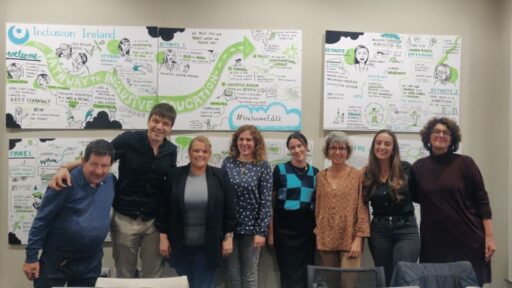
capito goes international: Our project meeting in Ireland
We traveled to Ireland to meet with our project partners for our international project “CCUV”. Learn more about it in this blog post!
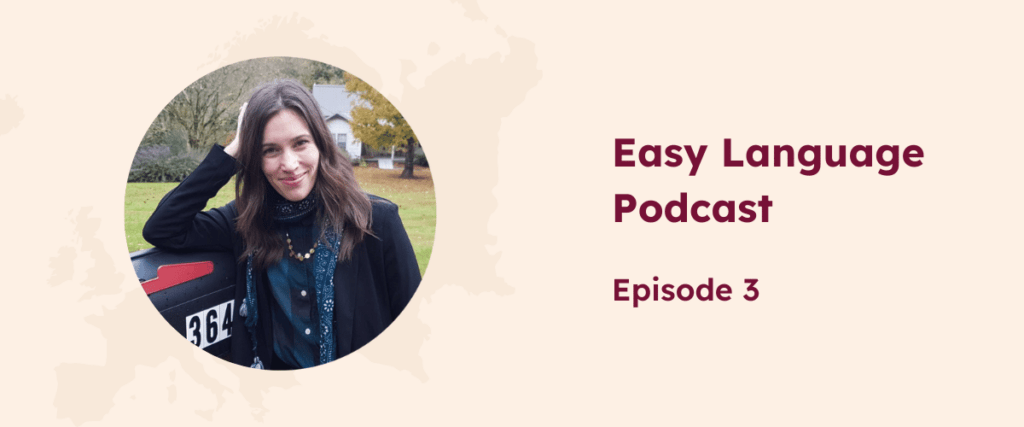
Easy Language Podcast Episode 3:
Erin McInerney is a researcher in linguistics at the University of Fribourg, where she is working on French translations of German criteria. She comes from America but has been living in France for the past 10 years, where she works with research teams at the University of Strasbourg, University of Fribourg, and the University of Glasgow.
Erin got in touch with easy-to-understand language when she was working on bilingualism in special populations as part of her research. The University of Fribourg is one of the primary partners of this project, although the main focus of the research is bilingualism in special populations rather than easy-to-understand language.
She is passionate about making language accessible to people with language impairments or difficulties with communication. She wants to contribute to making language more accessible for those who struggle with it, thus enhancing collaboration and understanding between people.
Erin believes that by making language more accessible, we can benefit from understanding how other people see the world and languages.
In conclusion, Erin McInerney is making a significant contribution to the field of easy-to-understand language and is dedicated to making language more accessible to those who struggle with it. We look forward to following her progress in this exciting and important area of research. In the following post, you will find the whole conversation of our 3rd podcast episode of “Easy Language”.
If you have any questions to our project or just want to get in touch with us, click here.
In the podcast episode, you’ll learn …
Anja: Okay, then let’s get started. Could you please introduce yourself and tell us a little bit about what you do?
Erin: Yes. My name is Erin McInerney, and I’m working with a team at the University of Fribourg on the French translations of the German criteria. And I’m also a researcher in linguistics.
Anja: Great. Could you tell us a bit about your background?
Erin: Yes. I originally come from America, but I’ve been living in France for about 10 years. I live in Strasbourg, which is right by the German border. And so I work with research teams at the University of Strasbourg, at the University of Fribourg, and at the University of Glasgow in Scotland.
Anja: Great. Have you always been into languages?
Erin: Growing up in Texas, I had some exposure to other languages, mostly Spanish. But I trained as an opera singer, actually. And because I was planning on doing that, I was interested in studying one of the languages that I was most likely to be singing in. And my school was very small, so they only offered Spanish. But I was able to advocate for a French program with some other students. So that’s where I began learning French. But you can imagine in small towns in Texas, we don’t necessarily get a lot of exposure to languages that aren’t very present in the community. So it was definitely a passion project, I guess I could say, to learn it. And again, having sung for many years that opened up my sensitivity towards a number of other languages.
Anja: I see. Super interesting. When did you first get in touch with easy-to-understand language?
Erin: So, my first contact with easy-to-understand language, without really realizing it, was when I was beginning my research with bilingualism in special populations. So the lab at University of Fribourg works most often with autism and bilingualism. But I have a history of working with Down syndrome and bilingualism. So my early research looked at what was then easy-to-understand language. But there wasn’t quite that label for it, at least in the research. So I was looking at very simple structures and also cognates between languages, in order to increase comprehension and retention of vocabulary.
Anja: I see. Very, very interesting. Why are you part of this project?
Erin: So I’m part of this project because the head of our lab, her name is Stephanie Durrleman, she was looking for someone to collaborate with for this project. So we very much work as a team. I’m lucky enough to come to most of the meetings, although Stephanie might appear at the meetings now and then. But she’s a very important and big presence, who’s taking care of examining all the work that I do, checking it up against her own research. She has a very, very successful career as researcher in autism and bilingualism. So a lot of her work looks at linguistic complexity. “How can we make language more accessible to people in populations that may have language impairments or may have difficulties with communication?”
And so I feel really fortunate to be working with her because her research backs up so much of the theory that I’m leaning on when I’m doing these translations.
Anja: I see. How is the University of Fribourg involved in Easy Language?
Erin: The University of Fribourg itself is obviously one of the primary partners of this project. But in terms of what they’re exploring university wide, it’s mostly within the lab that they’re looking at, again, bilingualism and special populations. So easy-to-understand language would be one sort of act of that research rather than the center of it.
Anja: What would you like to come out of this project?
Erin: I’m really, really drawn to this project for a number of reasons. Because as someone who’s taught languages for about ten years now, I’ve seen how they can be something that frightens people as much as excites people. And I know that when you have a specific impairment or if you’ve always seen language as a thing to overcome, it can be really difficult to want to approach a number of situations because language is socially situated and so many of our interactions hinge on the language being used. And if I can contribute to making that more accessible for any single person or any group of people, then I’ll be absolutely thrilled.
Anja: Great. Can you tell us a little bit about the availability of easy-to understand-language or information in easy-to-understand language? Like, is there a big offer?
Erin: Good question. So maybe speaking a little bit from the French context. In French, we do have something called a “FALC”: “facile à lire et à comprendre”. So “easy to read and understand” literally. But it’s more for a layperson and somewhat vague because it’s meant to be accessible to a wide audience. So I would say there’s still a lot of room to be done in this particular area of research.
Anja: So very interesting. What I find also very interesting is the question if particular languages are faced with different challenges in terms of making them more accessible.
Erin: It’s a really good question and it comes from a larger question posed in linguistics. Linguists get asked this question a lot and the thinking has evolved. There used to be thought that some languages are inherently more difficult than others, but today it’s not so much what we believe. We believe that each language is individual in its way of expressing things. And going on to that, what about these things that I can say in one language and can’t see in another? Are there really untranslatable things or words or phrases in a language? Most things can be translated, whether it’s in terms of a phrase or at the word level.
Anja: Do you also think that’s true for easy-to-understand language?
Erin: I think for easy-to-understand language, it’s going to be one of the things that we’re looking at, because our first level here is pure translation, basically. So my job is that I’m taking the German criteria and I’m translating it to French. I will remove anything that’s not specific to French. For example, if we’re talking about cases, if we’re talking about a third gender, I’m obviously not going to mention that in the French criteria. And then I will add the things that aren’t addressed in German, for example, certain structures like indirect and direct object structures in French. But other than that, my job right now isn’t to experiment. It’s to see how the translations stack up in terms of their efficacy. And then after the first round of testing, then I get the results back from our team. So Karine, who’s doing the team with Com’access, so they’ll do the testing and the focus groups and then I’ll be able to see: “This is how this was translated, but we need to rephrase this.” Or: “This wasn’t included because it wasn’t part of the original criteria.” And in order to keep the samples as reliable as possible, I didn’t just add extraneous information. So more on the second round is where we’re going to be able to compose a little bit more rather than just simply adapt or translate.
Anja: Can you tell us a little bit about the involvement of people with learning disabilities in your research?
Erin: In this project most people with learning disabilities are going to come in again on the second round. The first round is truly me at my computer working on the translations, checking them up against research, chatting with Stephanie, who again has many more years behind her in terms of practice than I do. So that’s the first phase. Then when it goes into the focus groups, that’s where we’ll be seeing the human level, how people are responding to this. And then when we do the marketing sessions or the breakout sessions, we’re really going to be able to get more input from the community. And I’m hoping at that point also to bring in the people that I’ve worked with who are bilingual people with Down syndrome, because they are French-English bilinguals. And so I believe they’d really be able to benefit from this project. It would be interesting as well to see how they respond to easy-to-understand language in French and in English. And so all of that’s really going to come with the second phase of the project, which will be around March of next year.
Anja: And that’s not too far away. Yeah. Very cool. One question I have that is not really related, or it is kind of related to Easy Language, is the topic of gender-inclusive language.
Erin: Great question.
Anja: For example, is there a discussion going on? Because in German, it’s quite emotional.
Erin: Yeah, it is. I mean, and this is again, why I’m a social linguist. So if there are any other types of linguists listening to this, they may disagree with me. Right. So social linguists take a socially situated view of language, which is that the language that’s happening between us right now is here in this time and this place. And it’s being informed by how we’re feeling, by the fact that there’s a microphone here. All of these things can play into how I’m speaking and how you’re speaking back to me. So when we deal with something that’s even more socially entrenched, like gender, it’s being informed by a huge intersection of factors. So in France, this is a conversation that we’re having right now. In French, when you do gender inclusive language, much like in German, it becomes complicated because our nouns are gendered. So that’s one level of gender inclusive language that’s complicated, you could say. But then when we’re speaking about people and using pronouns, it can start to be a little bit confusing because the way that we write in French means that I’m going to be adding punctuation with dots and with extra E’s. So for example, if I want to speak to a group of people and use gender-inclusive language and I’m saying, “Are you interested in this?”, I’ll say “interessés”. And usually you would just write “és” at the end. But with the gender inclusive style, we’ll write “é.e.s” to apply to a wide range of people. Of course, then the issue, and this is what we’re hearing from people who are gender fluid or who don’t identify with a single gender, is that that’s still applying to a male-female-binary. So they have pronouns in French like “iel”, which is our gender inclusive pronoun. But many people say, at least from what I’ve read, and also feedback from my own students, some of whom are gender fluid, is that they identify more with the English “they” pronoun because it feels more natural. Because what basically happened was that “they” was kind of lexicalized as a singular person pronoun. People were doing it naturally, not speaking about gender fluid individuals. And so it developed very organically as a great gender neutral pronoun, whereas “iel” was developed explicitly for gender fluid people. And due to that, it has a lot more pushback. Especially in France, where language is dictated by the Académie française, which is quite a singular thing in France. They are supposed to be all of “What is real French? What is real language? Is this really a word? Are we going to add it to the dictionary?” And so recently, I think it was early this year, Larousse added “iel” to its dictionary and there was a big pushback from the academy. Or it might have been another dictionary. I’m not 100% sure about that. But there was quite big pushback from the academy because it wasn’t sanctioned by them. So it’s a very emotional conversation, as you were saying, and I think it’s a very important time to listen to those people who feel excluded by language. Because if we can use it to communicate and describe ourselves, they have every right to be able to feel that way, too.
Anja: Thank you for these amazing insights. Is there anything else you would like to add or talk about?
Erin: I don’t think so. I really appreciate your questions. And again, I’d like to say that if I’m getting to speak today, it’s because I am fortunate to be working with Stephanie and with the University of Fribourg. I’m fortunate to be working with all of the teams here, both the company side and the university side. I’m lucky and all of the translator sides are lucky because we kind of got put into a situation where a huge amount of the work was done for us and we get to come in and do sort of the fun stuff, which is, I mean, if you think translating is fun, but also the sort of frosting on the cake thing where you’re really getting to see once again, you go into the focus groups, how it’s being experienced by the target population. And that’s been years of research and we’re sort of getting to come in at the end. And I’m very cognizant of the fact that I’m able to experience this is thanks to all the work that’s been done by the teams here and yet by our colleagues.
Anja: Great. Thank you so much.
Erin: Pleasure! Thank you.
Sounds exciting? Then sign up for our newsletter and follow us on Facebook, LinkedIn and Twitter! That way you’ll always be up to date. Feel free to leave us a comment if you have any questions or comments about the project.
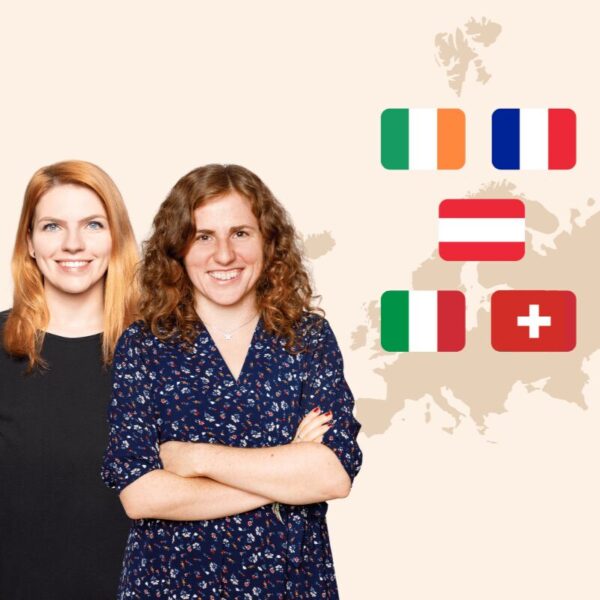
Are there many texts in Easy Language in English? How accessible are Italian authorities? And how do you write in a gender-sensitive way in French?
We asked these questions to experts from all over Europe.
Together we talk about easy-to-understand language in the respective national languages.
Listen now on Anchor, Spotify or Apple Podcasts:

The European Commission support for the production of this publication does not constitute an endorsement of the contents which reflects the views only of the authors, and the Commission cannot be held responsible for any use which may be made of the information contained therein.

We traveled to Ireland to meet with our project partners for our international project “CCUV”. Learn more about it in this blog post!
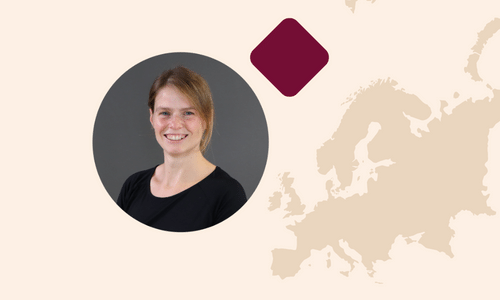
In this episode, we talk with lecturer and translator Marlene Dax about Easy Language in science communication.
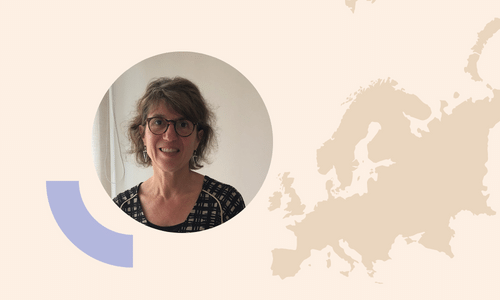
In this episode, we talk with cof-ounder of Com’access Karine Bardary about Easy Language in France.
capito is Italian and means “I get it.”
In the future, everyone should be able to say: “I have understood”.
+ 43 316 393 449 office@capito.eu
Headquarters
Heinrichstraße 145
8010 Graz
Austria
U.S. division
1247 Wisconsin Avenue NW Suite 201
Washington, DC 20007
USA
capito is part of the atempo group